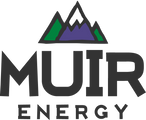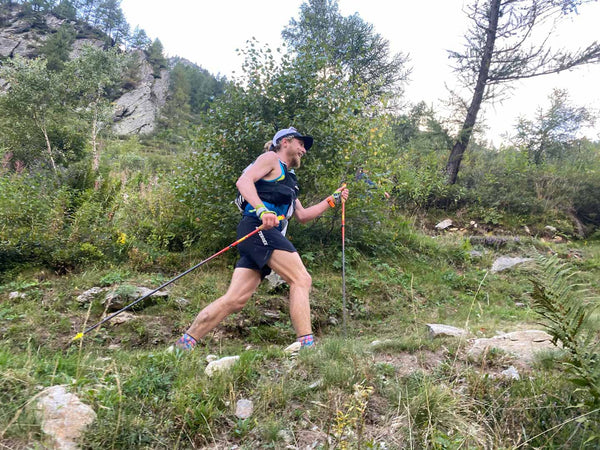Avery Collins’ UTMB CCC 100k: How He Prepared, Raced, and Fueled For a Top Finish Against 1,500+ Runners
Sep 22, 2021
BY GEORGIA DANIELSON, MUIR CONTENT EDITOR

This August, MUIR Athlete Avery Collins toed the starting line with over 1,500 other competitors at the UTMB CCC. The acronym ‘CCC’ stands for ‘Courmeyeur-Champex-Chamonix,’ three towns in three countries – Italy, Switzerland, and France – that the course weaves through. This iconic race features 21,000 feet of elevation gain and equal loss over 100km [62 miles] of beautiful but unforgiving terrain around the largest peak in western Europe: Mount Blanc.
Avery raced against ultra-running’s most elite from all over the world. He ran strong and smart from start to finish to a 15th place finish in 11h47m. We caught up with Avery to get the details on the race, his training, and his fueling:
MUIR: Well done on a great performance at the UTMB CCC 100k! How are you feeling?
AVERY: Thanks so much! Recovery is going well. I’ve been getting out and running a little bit.
M: Oh wow. You’re back at it already. Do you think running some amount helps with recovery?
A: Yeah, for sure. Coming off an ultra, you feel incredibly fit, but it’s important to keep your runs between 3-8 miles, or rather, under 60-90 minutes. The runs I’m doing are very non-committal; I’m just running as I feel.
M: That makes sense. We see some folks feeling good and they'll just keep putting in the miles. You’re not into that?
A: No [laughs.] After a big race like that, your energy levels are really low. Everything just gets so depleted. Your hormone levels get messed up, and running too much after a race can lead to total fatigue.
M: Yikes. Total fatigue is not a good place to stay for long…
You had an amazing race at CCC where you ran solid throughout the entire day. What was your strategy going into it?
A: Thanks! Yeah I just made the decision to run really smart and steady, and really start racing in Champex at 55km which is about halfway.
M: So what happened when you got to Champex?
A: I was about 30-35th overall, which was difficult to deal with being just 45k away from the finish to make up some ground. At that point, you have to really dig in and trust that your training is going to pay off and set you up to finish strong.
On the final climb, my quads started seizing up. I watched my legs vibrate from cramping so bad.
I got passed by one person on that climb, and I think I lost 17 minutes there. That would have been the difference between 10-15th place.
M: That’s wild; I can’t imagine watching the body do something like that. How did you react?
A: Well, the last aid station I was at before that climb, I stashed five salt pills. It wasn’t enough and I ran out and started cramping. Two salt pills would buy about 15 minutes of relief from cramping. The five I brought with me wasn't enough, though, so I had to slow down and ended up losing some time.
M: How was the weather? Was it hot?
A: I couldn’t have asked for better weather. I really only got super hot for about ten minutes of the race. I’m a heavy sweater, though, so no matter what the temperature is I have to really pay attention to my hydration.

M: Let’s talk about your hydration and fueling strategy. What was your plan?
A: I was shooting for about 400 calories per hour. I alternated a MUIR Strawberry gel every 45 minutes with a 300 calorie snack and just kept that going. At the aid stations, I had the electrolyte mix and ate a few things at most of them.
I was drinking about one water bottle per hour of electrolyte mix, which kept me hydrated up until the end of the race. I drank a lot of Coke towards the end, which is great because all of the sugar and caffeine makes you feel like an astronaut and I don’t drink it in any other situation.
Until the last eight miles of the race, my nutrition was perfect. I think I started drinking too much Coke and got behind on water and electrolytes. This was definitely a bummer; it caused the cramping issues going into the last climb.
M: What are your secrets for training for CCC?
A: I had 16 weeks of, honestly, perfect training. That was the first full training block I’ve ever had where everything just went perfectly without any interruption from injury.
I was able to run a lot of good miles in Silverton before leaving for Chamonix four weeks before race day.
The biggest confidence boost was the training weeks when I got to Chamonix: I ran 103 miles with 33k of vert the first week and then 114 miles and 40k of vert the next. I was already running big mileage in Silverton, but it was just such a confidence boost to top off my training with faster miles with more vert.
Then I went into a taper for the next two weeks leading up to the race.
M: Did you race before CCC?
A: No, I didn’t race, but I ran some shorter time goals like the Backbone [a loop in Southwest Colorado that includes summiting three 14ers.]
I also fast packed the UTMB course, which is 100miles and 34k of vert.
M: Tell us more about fastpacking in Europe. What’s that like?
A: I took four days to run the 171 km UTMB course.
When you fastpack the UTMB route, there are little refuges where you can get room and board, so when you’re running you don’t need hardly anything for camping. I didn’t even need half the stuff that I brought, but I wasn’t sure what the refuges would have.
The pack for fastpacking with refuges is still going to be heavier than what you’d bring on a normal long run. That was actually kind of nice because it made my pack for CCC full of required gear seem really light.
M: That sounds like an epic adventure. Is there anything else that you did to prepare for CCC?
A: Yeah, for sure. I did a lot of heat training in Silverton. We [Sabrina and I] first started experimenting with saunas and heat training in 2017 to prepare for the Western States 100, since it’s a notoriously hot race. I tend to really struggle with heat, so that’s something I wanted to train and try to get better at in case it was really hot at CCC.
I also hiked into Chicago Basin* with a 65lb pack a few weeks before flying to Chamonix that really prepared me for the hut trip.
I take a lot of naps, too, in the afternoon. Luckily I get the luxury to be able to do that, but getting more sleep just helps so much to recover in between training.
*an area in the Weminuche Wilderness in Southwest Colorado
M: Thanks so much, Avery, and again, well done on a stellar performance!



